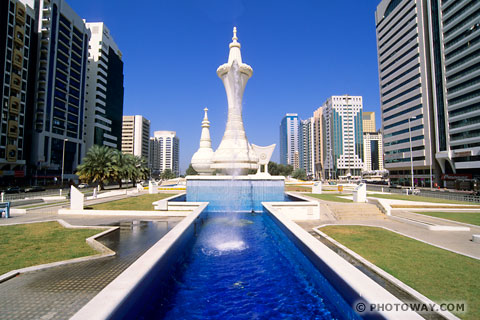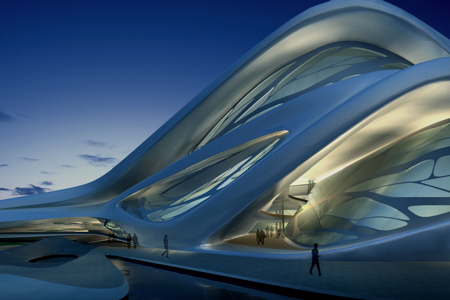 Abu Dhabi (Arabic: أبو ظبي Abū ẓabī, literally Father of gazelle) is the capital of, and the second largest city in the United Arab Emirates. Abu Dhabi lies on a T-shaped island jutting into the Persian Gulf from the central western coast. The city proper, making up an area of 67,340 km2 (26,000 sq mi), had an estimated population of 860,000 in 2008.
Abu Dhabi (Arabic: أبو ظبي Abū ẓabī, literally Father of gazelle) is the capital of, and the second largest city in the United Arab Emirates. Abu Dhabi lies on a T-shaped island jutting into the Persian Gulf from the central western coast. The city proper, making up an area of 67,340 km2 (26,000 sq mi), had an estimated population of 860,000 in 2008. Abu Dhabi houses important offices of the federal government, and is the seat for the United Arab Emirates Government and the home for the Emirati Royal Family. Abu Dhabi has grown to be a cosmopolitan metropolis. Its rapid development and urbanisation, coupled with the relatively high average income of its population, has transformed Abu Dhabi to a larger and advanced metropolis. Today the city is the country's center of political, industrial activities, and a major cultural, and commercial centre due to its position as the capital. Abu Dhabi alone generated 56.7% of the GDP of the United Arab Emirates in 2008. Abu Dhabi is home to important financial institutions such as the Abu Dhabi Securities Exchange, the Central Bank of the United Arab Emirates and the corporate headquarters of many companies and numerous multinational corporations. One of the world's largest producers of oil, Abu Dhabi has actively attempted to diversify its economy in recent years through investments in financial services and tourism. Abu Dhabi is the third most expensive city in the region, and 26th most expensive city in the world.[7] Fortune stated in 2007 that Abu Dhabi was the richest city in the world.
History
Parts of Abu Dhabi were settled in the 3rd millennium BC and its early history fits the nomadic herding and fishing pattern typical of the broader region. Modern Abu Dhabi traces its origins to the rise of an important tribal confederation, the Bani Yas, in the late 18th century, which also subsequently assumed control of the town of Dubai. In the 19th century the Dubai and Abu Dhabi branches parted ways.
Into the mid-20th century, the economy of Abu Dhabi continued to be sustained mainly by camel herding and the growing of dates and vegetables at the inland oases of Al-Ain and Liwa, and fishing and pearl diving off the coast of Abu Dhabi town, which was occupied mainly during the summer months. At that time most dwellings in Abu Dhabi town were constructed from palm fronds (barasti), with the wealthier families occupying mud huts. The growth of the cultured pearl industry in the first half of the 20th century created hardship for residents of Abu Dhabi as pearls represented the largest export and main source of cash earnings.
In 1939, Sheikh Shakhbut Bin-Sultan Al Nahyan granted petroleum concessions, and oil was first found in 1958. At first, oil money had a marginal impact. A few lowrise concrete buildings were erected, and the first paved road was completed in 1961, but Sheikh Shakbut, uncertain whether the new oil royalties would last, took a cautious approach, preferring to save the revenue rather than investing it in development. His brother, Zayed bin Sultan Al Nahyan, saw that oil wealth had the potential to transform Abu Dhabi. The ruling Al Nahyan family decided that Sheikh Zayed should replace his brother as ruler and carry out his vision of developing the country. On 6 August 1966, with the assistance of the British, Sheikh Zayed became the new ruler.[10]
With the announcement by the UK in 1968 that it would withdraw from the Persian Gulf area by 1971, Sheikh Zayed became the main driving force behind the formation of the United Arab Emirates.
After the Emirates gained independence in 1971, oil wealth continued to flow to the area and traditional mud-brick huts were rapidly replaced with banks, boutiques and modern highrises.
 property abu dhabi
property abu dhabi abu dhabi night view
abu dhabi night view Abu Dhabi World Trade Center By
Abu Dhabi World Trade Center By dolphin towers abu dhabi
dolphin towers abu dhabi al reem island najmat abu dhabi
al reem island najmat abu dhabi Abu Dhabi 2-real estate
Abu Dhabi 2-real estate Abu Dhabi picture
Abu Dhabi picture zha abu dhabi photo
zha abu dhabi photo abu dhabi nice view
abu dhabi nice view
